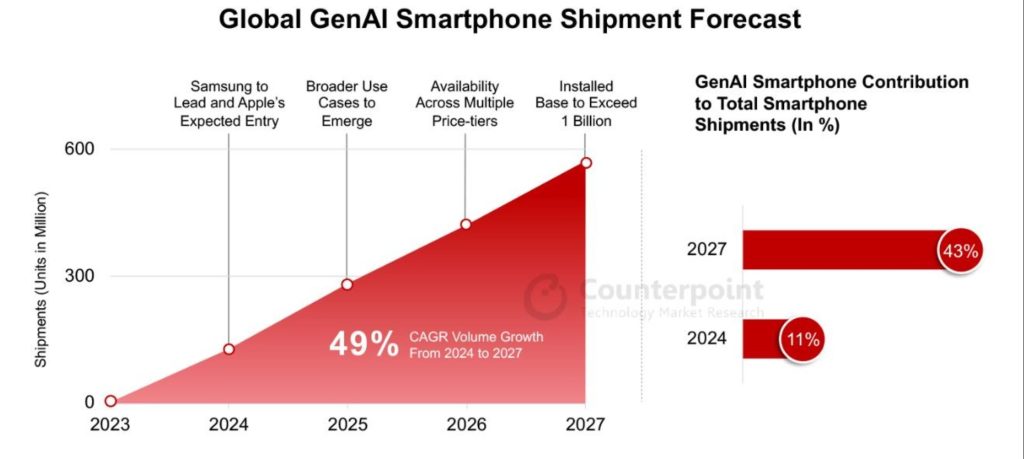Analysts expect GenAI smartphones to reach a turning point in 2025 as these devices enter broader price segments, particularly the +50,000/- INR price level.

Generative artificial intelligence (GenAI)-capable smartphone shipments will reach 11 per cent by 2024 and 43 per cent by 2027 to pass 550 million units in 2027 with 4x growth.
To subscribe please click tau.id/2iy6f and access our live channel.
Against the backdrop of Apple’s anticipated entry into the segment later this year, these estimates are higher than Counterpoint’s earlier forecast of December 2023.
ALSO CHECK: Elon Musk to Hire for his AI Company
What is Gen-AI Enabled Devices
GenAI smartphone as a mobile device leverages large-scale, pre-trained generative AI models to create original content or perform contextually-aware tasks.
Such devices to have multimodal capabilities, allowing them to process text, image, voice and other inputs to generate a variety of output and enable a user experience that is fluid and seamless.
However, a device should have hardware capabilities that are comparable to or exceed the performance of current flagship smartphones to effectively run generative AI models.

Companies Launching AI-Smartphones
More than 10 OEMs have launched over 30 GenAI-capable smartphones so far. AI in smartphones has been a key talking point since the start of this year, especially after the successful debut of a leading giant smartphone device company.
- Samsung has gained good mind share in marketing early AI use cases, with a momentum in the mid-to-premium smartphone segment as GenAI features get recognized more broadly in coming years.
- Apple’s anticipated entry in the space will further help the segment’s growth leading to immediately become a must-have feature in all mid-to-premium smartphone launches starting 2025.
- The Xiaomi series introduce an innovative feature that allows users to train the smartphone on their own face using photos from their gallery. Users can then generate realistic AI selfies in almost any setting by simply entering a text prompt.
- Oppo includes an impressive on-device AI feature called the AIGC Eraser, which allows users to remove unwanted objects or people from their photos without requiring an internet connection.
Conclusion
Smartphones of the future will be more personalized to cater to individual needs and preferences, and AI will play a central role in driving these personalized experiences. As OEMs differentiate themselves on AI positioning, the key here will be the evolution of AI use cases.



